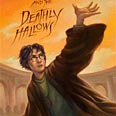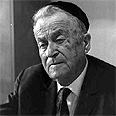
Harry Potter - Second rate?
Book cover

Agnon - Outdated?
Photo: GPO
Hello kids! You want a story? Do you want me to read it for you? Great, kids. Take your pacifiers out of your mouths and come sit on my lap. How old did you say you are? 14? You’re such big kids! What, you’re in junior high already? You’re not even kids?
Doesn’t matter. The Israeli Education Ministry thinks that it would be best for you if we read you a story in class – something easy, you know, Harry Potter, The Princess Diaries, stuff like that. In the next stage, I assume, immediately after the reading session, the ministry would recommend to breastfeed you, change your diaper, and proceed with your afternoon nap.
Yes, this is the level reached by Israeli education en route to becoming barely mediocre. This month we were informed that in junior high schools there is no longer any need to teach Chekhov, or Israeli Nobel Prize laureate Shai Agnon, “whom teenagers can’t quite relate to,” as the news story noted, after the Education Ministry’s updated curriculum designated Harry Potter as a suitable educational replacement.
Do I really need to go on with this piece? And if I do go on, is there any chance I too will be studied at schools? So yes, Anton Chekhov and Shai Agnon wrote a few things that “teenagers can’t quite relate to,” but rather, any human heart can relate to, on condition that someone brings the owner of this heart, even once, to this fountain.
And yes, this is the classic role of schools, among other things. Because before we are free to embark on the journey of life where we can read any second-rate novel we want, the Israeli education system used to make sure that we drink at least one small bottle of genuine literature.
What about our future?
Chekhov, Tolstoy, Agnon. I think that personally I was even challenged by Faulkner – yes, I know that today you may be detained on child abuse charges for less than that. But what can I say, the truth is I was quite touched by Chekhov, I adored Faulkner, and I realized that great Russian literature really is great (for less than 600 pages these people would not wake up in the morning and get into their leather boots.) I still recall the sense of achievement that overwhelmed my little heart upon finishing Anna Karenina.I do not regret any meaningful book that school forced me to read. I regret every moment I wasted on reading a second-rate novel, and we are talking about roughly three of those. If there is a stage in life where you have enough time and motivation for Russian literature, and if there is a stage in life where Chekhov’s universal revelations will shake your world, it is your teenage years.
Yes, they forced us to read them, but they helped us, explained, interpreted, challenged us. And we did what kids at this age do – we moaned with contempt – but most of us read, and some of us even continued on our own.
But now, the kids have someone else read it to them – the teacher sits there and reads it to them! – The Princess Diaries, and after that we don’t understand why The Economist says that the state of education in Israel doesn’t quite guarantee its future. Perhaps if they read the paper for us we would understand.















